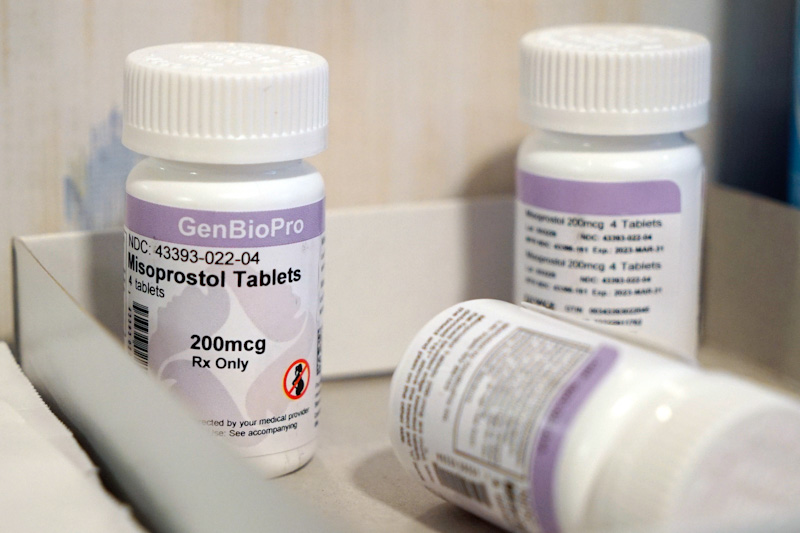Texas AG sues out-of-state doctor over mail-order abortion pills

Boxes of the drug mifepristone sit on a shelf at the West Alabama Women's Center in Tuscaloosa, Alabama, on March 16, 2022. (Photo by Allen G. Breed/The Associated Press)
Texas Attorney General Ken Paxton (R) sued a New York doctor this week for allegedly prescribing abortion pills to a suburban Dallas woman in violation of Texas law—setting up the first major legal challenge to “shield laws” enacted by some Democratic-led states to protect doctors providing abortion access after Roe v. Wade was overturned in 2022.
Paxton on Friday announced he had filed a complaint in Collin County accusing Margaret Daley Carpenter of violating state law banning the mailing or online prescribing of abortion medication to Texas residents. Carpenter, a doctor in New Paltz, New York, with the Abortion Coalition for Telemedicine (ACT), is also accused of practicing medicine in Texas without being licensed in that state.
“In Texas, we treasure the health and lives of mothers and babies, and this is why out-of-state doctors may not illegally and dangerously prescribe abortion-inducing drugs to Texas residents,” Paxton said in a statement Friday.
Carpenter could not immediately be reached for comment Friday, but New York Attorney General Letitia James (D) hit back against Paxton’s efforts.
“We will always protect our providers from unjust attempts to punish them for doing their job and we will never cower in the face of intimidation or threats,” James said in a statement.
Paxton’s complaint signals the start of a thorny interstate battle between Texas and New York, which in 2023 enacted a shield law protecting medical professionals who mail abortion pills to states that ban or restrict the drugs. By safeguarding doctors in Democratic-led states, shield laws offer a workaround to bans on mail-order abortion pills in states controlled by Republicans. Paxton’s challenge could upend that.
Medication abortion, commonly performed with the drugs mifepristone and misoprostol, now accounts for nearly two-thirds of abortions in the United States. Research has shown that the drugs are safe and effective.
Paxton’s complaint alleges that Carpenter endangered the life of a 20-year-old woman from Collin County who learned she was pregnant around mid-May. The woman contacted ACT’s telehealth services, and Carpenter prescribed her abortion medication, the lawsuit says. While it was unclear from the complaint when the woman took the pills, in mid-July, she went to the hospital with severe bleeding.
“The biological father of her unborn child,” who did not know about the pregnancy, was alerted by hospital staff that his partner had been about nine weeks pregnant before the abortion, the lawsuit says. The man suspected his partner had “done something to contribute to the miscarriage or abortion of the unborn child.” He searched her home, the complaint says, and found the boxes of abortion pills.
John Seago, president of Texas Right to Life, said abortion rights groups have turned to new tactics and business models to “undermine red-state laws” since the fall of Roe. Paxton’s complaint, Seago said, is a significant step to hold accountable the individuals or groups who are “violating our pro-life laws.”
“It’s our time for our side to respond to these things: That’s private lawsuits from private plaintiffs as well as the attorney general, using tools he has available,” Seago told The Washington Post on Friday.
The Texas lawsuit comes as antiabortion groups, galvanized by November’s election results, plan aggressive new actions on abortion restrictions, with their sights set on medication abortion in particular. Records requests and depositions in Paxton’s lawsuit, Seago said, could provide crucial insight into the operations of ACT and its allied organizations, such as Aid Access, a Europe-based group that provides abortion pills by mail to the United States.
Nancy Northup, president of the Center for Reproductive Rights, called Paxton’s lawsuit “a chilling attempt to scare doctors in other states from providing abortion care.”
“Telemedicine and medication abortion have been lifelines for people who live in states where abortion is banned,” she said in a statement. “Now, anti-abortion officials like Attorney General Paxton are using fear to crush what little access remains for their residents.”
The looming question is how New York will respond to the legal action, said Greer Donley, a professor at the University of Pittsburgh School of Law who studies medication abortion and interjurisdictional abortion conflicts.
A Texas court may enter a default judgment against Carpenter, whom Donley expects would not travel to Texas for a court appearance, and try to enforce the hundreds of thousands of dollars in civil penalties against Carpenter that Paxton has requested.
“It’s a bit far out, but we will wait to see what New York courts do if Texas tries to get that judgment enforced in New York—against a physician who is totally in New York, and hasn’t done anything illegal under New York laws,” Donley said.
Even if a New York court tries to block Texas from enforcing penalties on a protected resident, providers like Carpenter can still face risks if they leave their shield state.
“I think travel anywhere has some risks. What if you’re traveling to California and the plane has to land in an emergency in Texas?” Donley said.
Donley said the practicalities of Texas enforcing any action against Carpenter in such a scenario are rather far-fetched. But with antiabortion organizations emboldened by the ruling in Dobbs v. Jackson Women’s Health Organization, which overturned Roe, she said she does not underestimate how aggressively states like Texas may pursue punishment against abortion providers.
“I’ve said this since Dobbs: There’s nothing in this world anymore that’s a zero-risk game,” Donley said.



